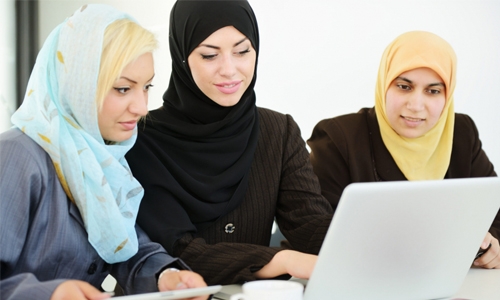Bahrain support women to mitigate COVID-19 impact
TDT | Manama
Bahrain is supporting women by extending a “gender balance” approach to mitigate the negative impact of the coronavirus (COVID-19), ensuring that they do not become social and economic victims of the pandemic.
This was pointed out by Supreme Council for Women (SCW) secretary general Hala bint Mohammed Jaber Al Ansari in an article she published recently on the World Economic Forum (Davos) website.
The Kingdom is a prime example of how it is excelling in the fight against the deadly respiratory illness through its efforts to contain the social and economic impacts of the pandemic on women and their families, she noted.
These efforts stem from the firm belief that by improving gender balance and supporting Bahraini women at home and at work, the country can unleash some of those benefits for society as a whole.
She also outlined women’s influential role in fight against the pandemic and highlighted the Kingdom’s measures to mitigate its negative impact on them.
“Much of the recent progress on women’s advancement could be at risk of collapse due to the coronavirus pandemic. Indeed, as reports from around the world indicate, the current recession could substantially widen the economic gender balance gap,” Al Ansari wrote.
She noted that in an April report, the United Nations declared that women would be the group hardest hit by the pandemic.
“Women’s lives will be disproportionately and differently affected from men’s for several reasons – these include less access to social protections and a greater chance of heading households,” she said.
Al Ansari, however, said figures show that Bahrain has made progress towards gender balance in business ownership, with 42% of all commercial registrations in the kingdom female-owned.
On the enterprise front, the country has the highest share of female founders in the world, with 18% of homegrown start-ups founded by women, compared to 15% in London and 16% in Silicon Valley.
Additionally, Bahrain is extending a “gender balance” approach to cushion the impact of the coronavirus.
Al Ansari stressed that organisations like the SCW help to ad- dress both the urgent and more long-term needs of women during these turbulent times.
Such approaches reflect the commitment of the Kingdom to upholding the progress achieved by Bahraini women both socially and economically, and to proactively contain the implications of the pandemic particularly on women.
(Three initiatives)
In her article, she referred to three initiatives to extend support to women during the pandemic.
1. Support the female workforce in and from the home
Healthcare workers are among those who have borne the brunt of the pandemic, as they work long hours in stressful conditions.
Women comprise close to 70% of the global healthcare work- force, WHO data shows, and Bah- rain is no exception to this given that Bahraini women make up the vast majority of frontline workers, making up 75% of the national taskforce for combating the coronavirus.
Realising the importance of the female presence at the frontline, the Bahrain government adopted a recommendation issued by the SCW to grant the spouses of women assuming vital frontline duties the opportunity to work remotely.
Additionally, from the earliest stages of the outbreak, His Majesty King Hamad bin Isa Al Khalifa directed authorities to en- able mothers in the public sector to work from home, while stores have been setting aside their first hour of operation for pregnant women and the elderly.
2. Encourage psychological counselling – virtually
Through a campaign launched by the SCW early in March 2020 entitled “Together for the Safety of Bahrain,” a programme called Your Remote Advisor was introduced to ensure the contin- uous provision of the Council’s psychological, family, legal and economic consultations.
The programme conducts consultations via video conferencing and instant live chats in order to respond to requests for support and remote guidance. To date, the programme has provided over 8,000 consultations.
With a comparatively relaxed lockdown and with institutions such as the SCW and civil society organisations stepping up counselling for women, there has been progress in tackling domestic abuse and conflict against women in Bahrain.
3. Waiving women’s debts
In May 2020, Her Royal Highness Princess Sabeeka bint Ibrahim Al Khalifa, president of the SCW, extended a loan and debt waiver to women with out- standing debts - who are primarily divorced, widowed or are suffering from chronic diseases - facing court orders to repay their financial dues.
In line with other national efforts, the SCW facilitated the payment of these women’s dues in coordination with the National Taskforce for Combating COVID-19. Additionally, women and men in debt were able to register with a new programme called Fael Khair (persons of goodwill), which connects those who need loan assistance with anonymous donors.
Related Posts

